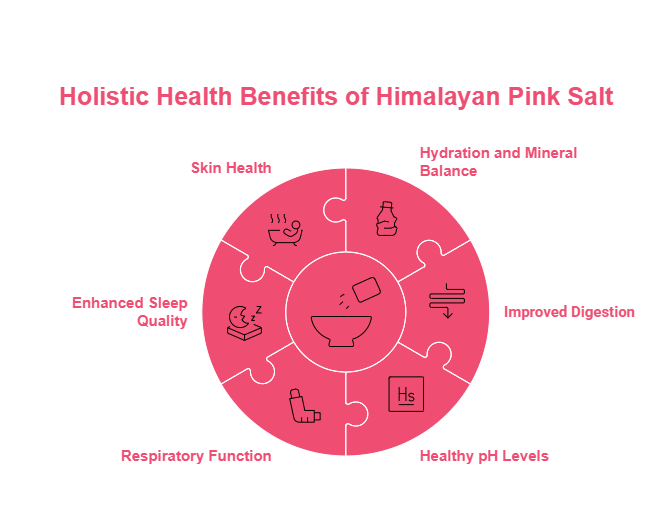Health Benefits of Himalayan Pink Salt: Nature’s Mineral Treasure
- Zayan Rauf

When it comes to natural health and wellness, some of the best remedies are not found in a lab but in nature itself. One such gift is Himalayan Pink Salt. Known for its soft pink color and rich mineral content, this salt is more than just a seasoning for your food. People around the world value it for its unique taste, health benefits, and natural purity.
At Sobaan Salts, we believe in bringing you the finest quality Himalayan Pink Salt, directly sourced from the ancient salt mines of Pakistan. In this blog, we will explore what makes this salt special, its many health benefits, and simple ways you can use it every day to improve your overall well-being.
Table of Contents
The Story Behind Himalayan Pink Salt
Himalayan Pink Salt is a rock salt mined from the Khewra Salt Mine in Pakistan, one of the oldest and largest salt mines in the world. This salt is believed to have formed millions of years ago when ancient seas evaporated, leaving behind pure salt deposits that were preserved under layers of rock and earth.
The pink color comes from natural minerals like magnesium, potassium, and calcium. These minerals are what make Himalayan Pink Salt different from regular table salt, both in taste and in nutritional value.
Read More: Himalayan Salt History
Why Himalayan Pink Salt is Better than Regular Salt
Most people are used to regular white table salt, which is heavily processed and stripped of many natural minerals. It often contains additives like anti-caking agents. Himalayan Pink Salt, on the other hand, is naturally rich in over 80 trace minerals and does not go through harsh chemical processing. This makes it a cleaner and healthier choice for your body.

The taste is also slightly different. Himalayan Pink Salt has a more balanced and mild flavor compared to the sharpness of regular salt, which makes it perfect for enhancing the natural taste of food without overpowering it.
Health Benefits of Himalayan Pink Salt
Here are some of the top health benefits that have made Himalayan Pink Salt popular worldwide.
1. Supports Hydration and Mineral Balance
Our bodies need the right balance of minerals to stay hydrated and function properly. Himalayan Pink Salt contains essential electrolytes like sodium, potassium, and magnesium, which help maintain fluid balance in your cells. Adding a pinch to your drinking water or meals can help you stay refreshed, especially during hot weather or after exercise.
2. Improves Digestion
Himalayan Pink Salt can stimulate the production of digestive enzymes and help your stomach break down food more effectively. Many people find that using it in meals or dissolving it in warm water before eating can support better digestion and reduce bloating.
3. Promotes Healthy pH Levels
Our modern diets often make our bodies more acidic, which can lead to various health issues over time. The minerals in Himalayan Pink Salt can help maintain a healthy pH balance, making your internal environment less favorable for harmful bacteria.
4. Supports Healthy Respiratory Function
Some people use Himalayan Pink Salt inhalers or visit salt rooms for respiratory relief. Breathing in the fine salt particles can help clear mucus, reduce inflammation in the airways, and improve breathing for people with asthma, allergies, or sinus issues.
5. Enhances Sleep Quality
Magnesium and other minerals in Himalayan Pink Salt help regulate hormones that promote restful sleep. A warm drink with a pinch of pink salt before bed may calm your nervous system and help you sleep more deeply.
6. Improves Skin Health
When used in baths or scrubs, Himalayan Pink Salt can help remove dead skin cells, improve circulation, and detoxify your skin. The minerals can leave your skin feeling softer and more refreshed.
You might also like to read The Surprising Health Benefits of Drinking Himalayan Salt Water
Everyday Uses of Himalayan Pink Salt for Better Health
Himalayan Pink Salt is not only good for seasoning food, but it can also be part of your daily wellness routine. Here are some simple and practical ways to use it:
1. Cooking and Seasoning
Replace your regular table salt with Sobaan Salts’ Himalayan Pink Salt for a healthier option in all your recipes from soups and salads to grilled meats and baked goods.
2. Morning Mineral Water
Start your day by dissolving a pinch of Himalayan Pink Salt in a glass of warm water. This can boost hydration, improve digestion, and give you a gentle energy lift.
3. Bath Soaks
Add a cup or two of Himalayan Pink Salt to your bathwater for a relaxing soak. This can help soothe sore muscles, detoxify your skin, and promote relaxation.
4. Salt Scrub
Mix Himalayan Pink Salt with coconut oil or olive oil to create a natural exfoliating scrub. This can leave your skin smooth and glowing.
5. Salt Inhalation
For respiratory health, you can use a salt inhaler filled with Sobaan Salts’ Himalayan Pink Salt crystals. This can help clear your airways and support easier breathing.
6. Homemade Electrolyte Drink
Mix water, a pinch of pink salt, and a little honey or lemon juice for a natural electrolyte drink after workouts or on hot days.
Quick Comparison Table: Himalayan Pink Salt vs Regular Table Salt
Feature | Himalayan Pink Salt | Regular Table Salt |
Mineral Content | Contains over 80 trace minerals | Mostly sodium chloride, with additives |
Processing | Minimal, natural | Heavily processed |
Color | Pink, due to natural minerals | White |
Taste | Mild and balanced | Sharp and strong |
Health Benefits | Supports hydration, pH balance, digestion, skin, and more | Limited |
Source | Khewra Salt Mines, Pakistan | Various sources worldwide |
How to Pick the Best Himalayan Pink Salt
Not all Himalayan Pink Salt is the same. At Sobaan Salts, we take pride in sourcing only the highest quality salt directly from the Khewra mines. Our salt is carefully cleaned and packaged without harmful chemicals, ensuring you get the purest form of this natural treasure.
By choosing Sobaan Salts, you are not only getting authentic Himalayan Pink Salt but also supporting a brand that values health, quality, and customer trust.
Read more: Process Of Himalayan Salt Mining
Final Thoughts
Himalayan Pink Salt is more than just a pretty seasoning. It is a mineral-rich gift from nature that can improve your health in many ways from keeping you hydrated to support digestion, skin health, and even better sleep. Whether you use it in your cooking, in your bath, or as part of a natural wellness routine, it offers a simple and enjoyable way to care for your body.
If you want to experience the benefits for yourself, make the switch to Sobaan Salts’ premium Himalayan Pink Salt. Pure, natural, and straight from the heart of the Khewra mines it’s nature’s treasure for your health and well-being.
Daily salt consumption, including pink salt, should not exceed 5 grams per the nutrient reference values for Australia and New Zealand to avoid health risks like hypertension. Source: PMC (NIH)
References:
Share This Post
Article By

